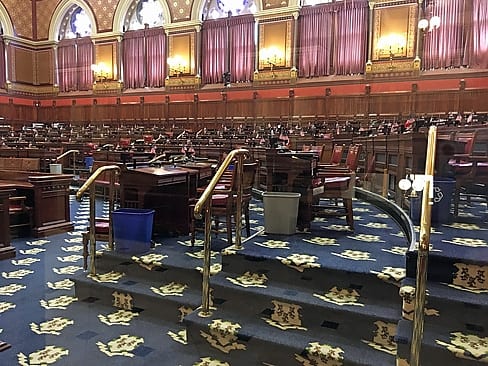Special Session Has Its Limits

Audio By Carbonatix

Empty House chamber. Courtesy of CTNewsJunkie.com
There were several topics that that the General Assembly was discussing when the session abruptly ended this spring, but they won’t all be part of the upcoming special session.
By Christine Stuart, CTNewsJunkie.com
Removing the religious exemption for childhood vaccines was one of the last things the General Assembly was debating when COVID-19 hit and the legislative session was adjourned, but it’s not part of the special session agenda. Neither are changes to workers’ compensation laws or nursing homes.
Gov. Ned Lamont and legislative leaders decided on four topics for the special session earlier this week: police accountability, absentee ballots, extending the telehealth executive order to January, and capping the cost of insulin.
Aside from the absentee ballot issue and the extension of telehealth services and insurance reimbursement, none of the topics deals directly with the COVID-19 pandemic or the more than 50 executive orders Lamont has signed since March 10.
Advocacy groups like AARP appreciate the topics the legislature has agreed to raise, but are concerned that no action is being taken to address the COVID-19 crisis.
“Absentee voting, telehealth, and skyrocketing insulin prices are extremely relevant to the lives of older Connecticut residents, and all of these issues have been made more urgent by the COVID-19 pandemic,” AARP Connecticut Director Nora Duncan said. “However, Connecticut’s elected legislators must not turn their back on our nursing home residents and their families, who have already made enormous sacrifices during this pandemic. We recognize the significant and unprecedented challenges due to this pandemic, but how much more pain and loss should our most vulnerable residents and their families have to face?”
Duncan said in recent weeks, the Lamont administration has “relaxed testing standards for nursing home staff, which puts both staff and residents at increased risk.” She said more than 2,700 nursing home residents have died and visitors, private aides, and ombudsmen are still not allowed to enter these facilities.
Lamont signed an executive order 7AAA that says nursing home staff does not have to be tested if they haven’t had any positive cases in past 14 days at the nursing home.
“Many things have happened to nursing home residents and their families during this pandemic. A special session represented an opportunity for something to happen with them,” Duncan added.
House Majority Leader Matt Ritter, D-Hartford, said they plan to come back in September for another special session.
He agreed with Duncan that there’s more the state needs to be doing, but at the moment the “quickest and best response the state still has is the governor’s executive orders.”
Labor has also been pushing to include a change to the workers’ compensation law that would presume someone who contracted COVID-19 during this time period got it at work.
“The workers’ comp issue must be addressed in September, if not earlier,” Ritter said.
Sal Luciano, president of the AFL-CIO, said there’s compromise legislation drafted by Rep. Sean Scanlon that would limit the time from March 10 to May 10, which is at a time when people weren’t provided personal protective equipment.
“If we don’t do it now I don’t think it’s going to get done,” Luciano said. “We’re not going to get it in September.”
Ritter said negotiations over the bill are still ongoing but he believes that “if you worked at a nursing home in mid-March and contracted COVID-19, you got it from the nursing home.” He pointed out that nothing else was open in the middle of March and “that bill has got to get done.”
About another hot topic from the regular session that was iced by the pandemic shutdown – removing the religious exemption to vaccinations – Ritter said, “The debate is not going away.” He said the state of Connecticut deserves to know where their elected officials stand on this issue and it will come up very early in the next legislative session.
Vaccine advocates, like other interest groups, have been holding meetings with lawmakers hoping to gain enough momentum to add it to the September special session.
In the meantime, Vaccinate Your Family conducted a poll of 600 voters which found nearly nine out of 10 parents in Connecticut believe children should be required to receive vaccines with nearly 75% in strong agreement.
The poll conducted June 9-16 also found 87% of adults statewide and across party lines agree that children should be required to receive recommended vaccines against diseases in order to be enrolled in schools and daycares. And 65% of adults (42% strongly) support proposed legislation that would only allow parents to opt their children out of daycare and school vaccine requirements for medical reasons.
“Despite the loud voices of a vocal minority, the evidence is clear, Connecticut parents want their kids to be protected from preventable diseases, and vaccines are the best way to do that,” Amy Pisani, executive director of Vaccinate Your Family, said. “Now more than ever, we need to ensure the loopholes that have allowed the vaccination rates among kids in our state to drop are closed, and passing legislation to require vaccinations for daycare and schools is how we will achieve that.”
Erin Jones, legislative and strategic counsel at March of Dimes, said, “Vaccines are the greatest and most effective way to protect our kids from preventable diseases. From birth to college, kids should be immunized to maximize their health.”
Jones said if the pandemic “has taught us anything, it’s the value of disease prevention. Requiring childhood immunization from preventable diseases is our obligation to them and the greater public’s health.”
Republished with permission from CTNewsJunkie.com, all rights reserved.
Like what you see here? Click here to subscribe to We-Ha’s newsletter so you’ll always be in the know about what’s happening in West Hartford! Click the blue button below to become a supporter of We-Ha.com and our efforts to continue producing quality journalism.



